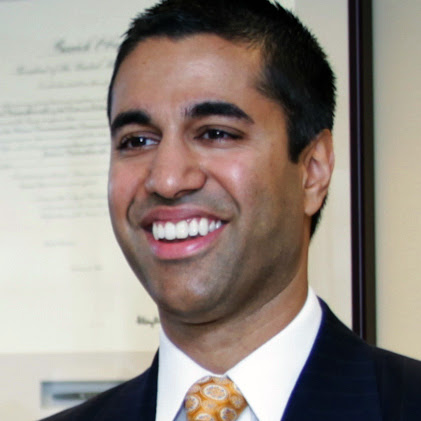Janine Jackson interviewed Jessica Gonzalez about new FCC chair Ajit Pai for the February 17, 2017, episode of CounterSpin. This is a lightly edited transcript.
FAIR February 24, 2017

Jessica Gonzalez: “Our voices are making a difference, and making it more difficult for them and the administration to undo all of the important consumer protections that we fought so hard for.”
Janine Jackson: Regulators who don’t much believe in regulation are looking like a hallmark of the Trump administration. What does that mean for the access to communication and information that’s critical to our daily lives? The newly appointed chair of the Federal Communications Commission, Ajit Pai, doesn’t want to actually eliminate the agency, as far as we know, but what does his record suggest for his term leading what’s meant to be the public’s advocate in the communications realm? Jessica Gonzalez is deputy director and senior counsel at the group Free Press. She joins us now by phone from Los Angeles. Welcome to CounterSpin, Jessica Gonzalez.
Jessica Gonzalez: Thank you.
Ajit Pai (photo: FCC)
JJ: Like the new administration overall, Ajit Pai has come out of the box with a flurry of things. A number of them came out on a Friday, and sort of went under the radar. I would like to start, though, with the digital divide, which is not a thing of the past, as many people may think. There are still many who, for reasons of locality or of affordability, cannot get reliable internet access. Now, Ajit Pai, I understand, has said that the digital divide is a “top priority” for him. Is that convincing?
JG: I think with Ajit Pai, much like his boss at the White House, we need to really watch what he does and not what he says. He’s talking a really good game on digital divide, but when you look at his history, and also his plans for the future, it tells a very different story. If you look just going back into his past, because he has been on the Commission for many years now, we know that he voted against Lifeline Modernization, and that proceeding is set to bring broadband to millions of poor Americans. He also voted against E-Rate Modernization, to help bring faster internet speeds and internet connections to schools and libraries in poor neighborhoods.
And when you look at what he’s done since he’s been the chairman, he’s spelled out a comprehensive plan that he says will bridge the digital divide, but in fact what it is is tax breaks for wealthy companies to build and to overbuild high-speed internet across the country. And this does not address the main barrier to broadband adoption for poor Americans, which is the high cost of the services. And so he’s worked to undermine Lifeline, which is the only federal program that helps make home broadband access more affordable, and he’s voted against arming schools and libraries with affordable broadband.
To learn more about Rise Up Times and support
Media for the People! with a donation click here.
Not only that, in the sweeping order that you mentioned in the intro—the Friday news dump, if you will—he actually took a specific action to undercut the efforts of nine companies that were preparing to provide Lifeline broadband services for poor folks. So his actions tell a very different story, and I don’t believe that he has a sincere commitment to bridging the affordability gap.



